How Retail Businesses are Adapting to AI in 2025
The introduction and availability of artificial intelligence (AI) is one of the biggest disruptions to the Australian business landscape in the past decade. Slowly but surely, it is transforming the way Aussie SMEs do business.
To better understand just how AI is impacting SMEs, BizCover surveyed 965 small businesses as part of The Australian Small Business AI Report 2025. This special report included 95 businesses from the retail sector.
Digital-first sectors like marketing, consulting and ICT seem to be powering right ahead with AI integration; many businesses in these areas see it as very important, if not essential, to daily operations.
But what about the retail industry? In a sector built on personal service and face-to-face connection, is there room for machines?
The below report details findings from 95 businesses in the retail sector, giving a rounded view on their stance towards AI, alongside commentary from BizCover’s Head of Marketing, Sharon Kenny.
Key takeaways
- Growing AI adoption with mixed importance: 70% of small retail businesses currently use AI, and 83% either use or plan to adopt it. Retail ranks fifth among surveyed industries for AI uptake, reflecting steady growth. However, only 53% consider AI important or essential to daily operations, showing cautious experimentation.
- AI enhances efficiency and customer engagement: Retailers primarily use AI to improve customer service, personalise marketing, and support faster decision-making. AI is seen as a smart assistant that boosts responsiveness and operational efficiency rather than a full replacement for human roles.
- Skills gap across hard and soft competencies: 69% of retailers struggle to find a mix of hard and soft skills, with customer service, communication, and time management most in demand. Upskilling focuses on creativity, communication, and digital literacy, though only 10% invest in specialised AI skills.
- Resistance to AI fully replacing roles: 36% of retail respondents believe AI cannot replace any tasks or full roles, the second highest resistance among industries. While 64% see AI potentially replacing some tasks or roles, most view AI as automating specific functions, not entire jobs.
- Key roles vulnerable to AI automation: Stock controllers, customer service representatives, and e-commerce specialists are seen as most at risk of AI disruption. Yet 31% believe no roles are significantly threatened, higlighting the continued value of human interaction in retail.
- Positive but balanced sentiment on AI impact: 61% of retail professionals feel positive about AI’s influence on their careers, appreciating its role in enhancing efficiency and customer engagement. Meanwhile, 32% remain neutral, and only 7% express concern about job security, indicating optimism tempered by realism.
AI adoption in the retail sector: Current usage and trends
Artificial intelligence is gaining ground in the Australian retail sector, with 70% of small retail businesses already using AI tools in some form. A further 13% plan to adopt AI within the next two years. But 17% say they have no plans to integrate AI into their operations at all.
Out of all seven sectors surveyed, retail ranks fifth in terms of AI adoption. It trails behind marketing (91%), ICT (83%), consulting (79%) and accounting (71%), but sits ahead of architecture (60%) and health (51%).
“While adoption is still cautious compared to digital-first industries, it’s clear that AI is starting to become a practical tool in the retail toolkit,” says Kenny.
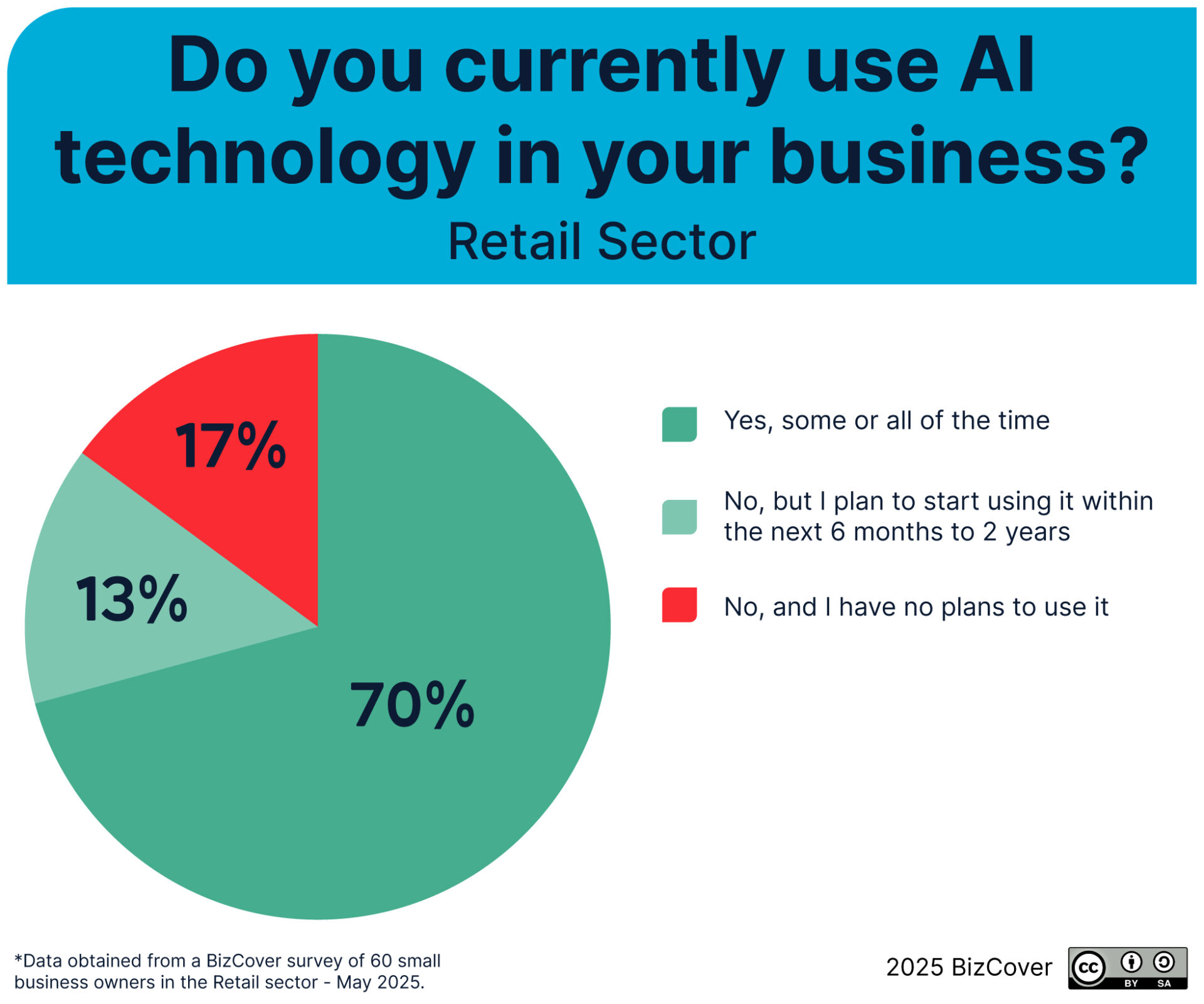
How retail businesses are using AI
The top ways retail businesses are using AI include:
- Marketing, content creation, and copywriting.
- Customer communications and support.
- Problem-solving and AI-powered assistance.
These responses reflect retail’s strong focus on customer engagement and efficiency, with AI helping businesses personalise messaging, respond faster to enquiries, and explore new ideas or improvements.
“Retail has always been a highly competitive and fast-moving environment,” says Kenny. “It makes sense that retailers would be using AI to sharpen their marketing, streamline external communications, and support faster decision-making.”

Barriers to AI adoption in retail
While AI offers plenty of potential, many retailers are still unsure about how to make it work for their business. The most common barriers include:
- Uncertainty about how AI works or how to get started.
- Feeling that AI doesn’t apply to their specific business needs.
- Concerns about the accuracy or reliability of AI tools.
This shows that while interest is growing, uncertainty remains the biggest hurdle. Many retailers seem to be holding back until they have a clearer understanding of how AI can support their day-to-day operations – and more confidence in the results it can deliver.
“There’s a lot of hype around AI,” says Kenny. “But retailers want to know more about it before they fully commit. They want to understand how AI fits within the day-to-day reality of the retail world.”
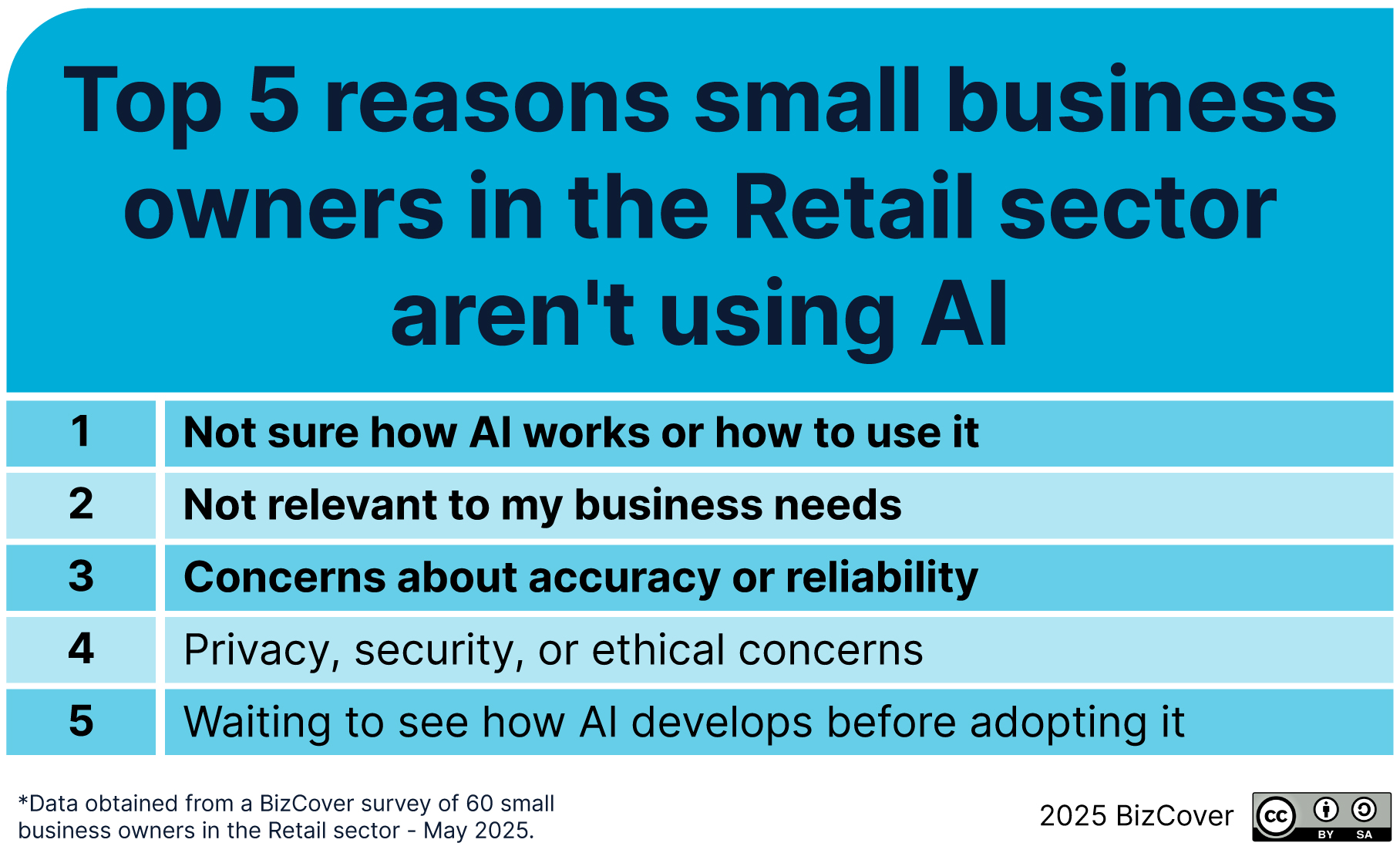
AI’s importance to daily operations in retail
Just over half (53%) of retail business owners say AI is important – or even essential – to their everyday business operations. But nearly as many (47%) say it’s not very important or not important at all, revealing a nearly even split.
When looking to the future, 34% believe AI will significantly boost productivity, while 29% think it will help enhance their current services. Still, a quarter of retailers remain unsure about its impact, and 12% expect it will have little effect.
“AI is making inroads in retail, especially where it can boost marketing and efficiency,” Kenny points out. “But many retailers are still unsure of its long-term value. This seems to say that support and education will be key to more widespread adoption.”
For now, retailers are satisfied with testing the waters and figuring out where it fits best in their operations, instead of rushing into things without the right information.
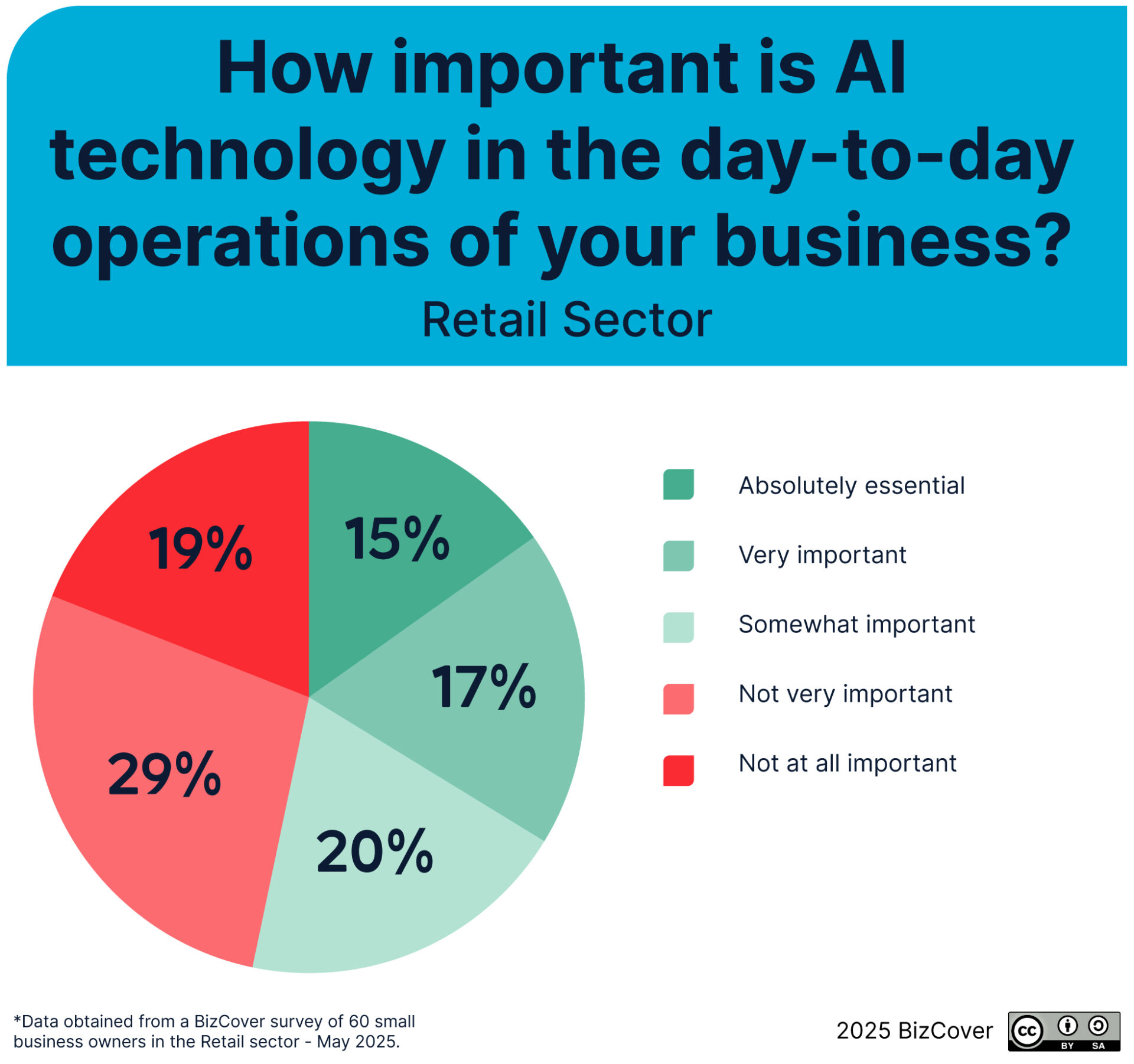
AI’s impact on skills in the retail sector
Retailers are divided when it comes to how AI will impact the skills landscape. Nearly half (47%) expect that new skills will be in demand over the next three to five years, while 37% think some current skills may become obsolete. At the same time, 31% say they’re unsure – highlighting ongoing uncertainty about how AI will affect everyday retail tasks, especially in customer-facing roles.
Right now, the most in-demand skills in retail are soft skills like customer service, communication and time management. These are seen as essential for delivering a great customer experience and keeping up with the pace of retail operations.
Could AI replace humans in the retail workforce?
“Retailers are remaining protective of the interpersonal abilities that underpin great customer service, despite hiring challenges,” notes Kenny. “As we’re seeing the Australian business landscape change, human connection is still seen as retail’s biggest competitive advantage.”
Retailers are showing strong resistance to the idea that AI could fully replace human workers. In fact, 36% of small retail businesses say AI could not replace any tasks or roles in their operations. This is the second-highest rejection rate across all sectors, just behind Health (42%).
“[Retailers] want to enhance what they’re already good at, not replace it,” Kenny comments.
Keeping this in mind, 64% still believe AI could automate at least some tasks or roles. Of these, half say AI could replace specific tasks but not entire job functions. This suggests that retailers can see the benefits AI has to offer, without looking to actually replace the human workforce. In an industry where the human touch can sometimes make or break a business, investing in people, rather than AI, remains the priority.
According to the survey, the roles most vulnerable to AI disruption in retail include stock controllers (34%), customer service representatives (31%), and e-commerce specialists (27%). These roles typically involve routine, data-driven or communication-heavy tasks that are increasingly automated through chatbots, self-service checkouts and inventory management systems.
How is AI affecting hiring practices in retail?
Despite the retail sector’s preferences for a human-led workforce, finding the right talent is proving to be extremely difficult. Nearly 7 in 10 retail business owners (69%) say they struggle to find the skills they need. For 34%, the challenge lies in finding candidates with a strong mix of both hard and soft skills.
When it comes to actually using AI instead of hiring staff or outsourcing, the sector is split. Just under half (46%) are open to using AI tools in place of people for certain tasks. The remaining 54% say they are unlikely or unwilling to make that shift. This further highlights the high value placed on human judgement, customer interaction and in-person service within the retail sector.
Kenny says, “Retailers recognise the growing role of AI in automating routine and data-heavy roles such as stock management and customer service. However, the sector values human interaction and personalised service, resulting in relatively slow adoption rates and a general resistance to fully replacing staff with AI.”
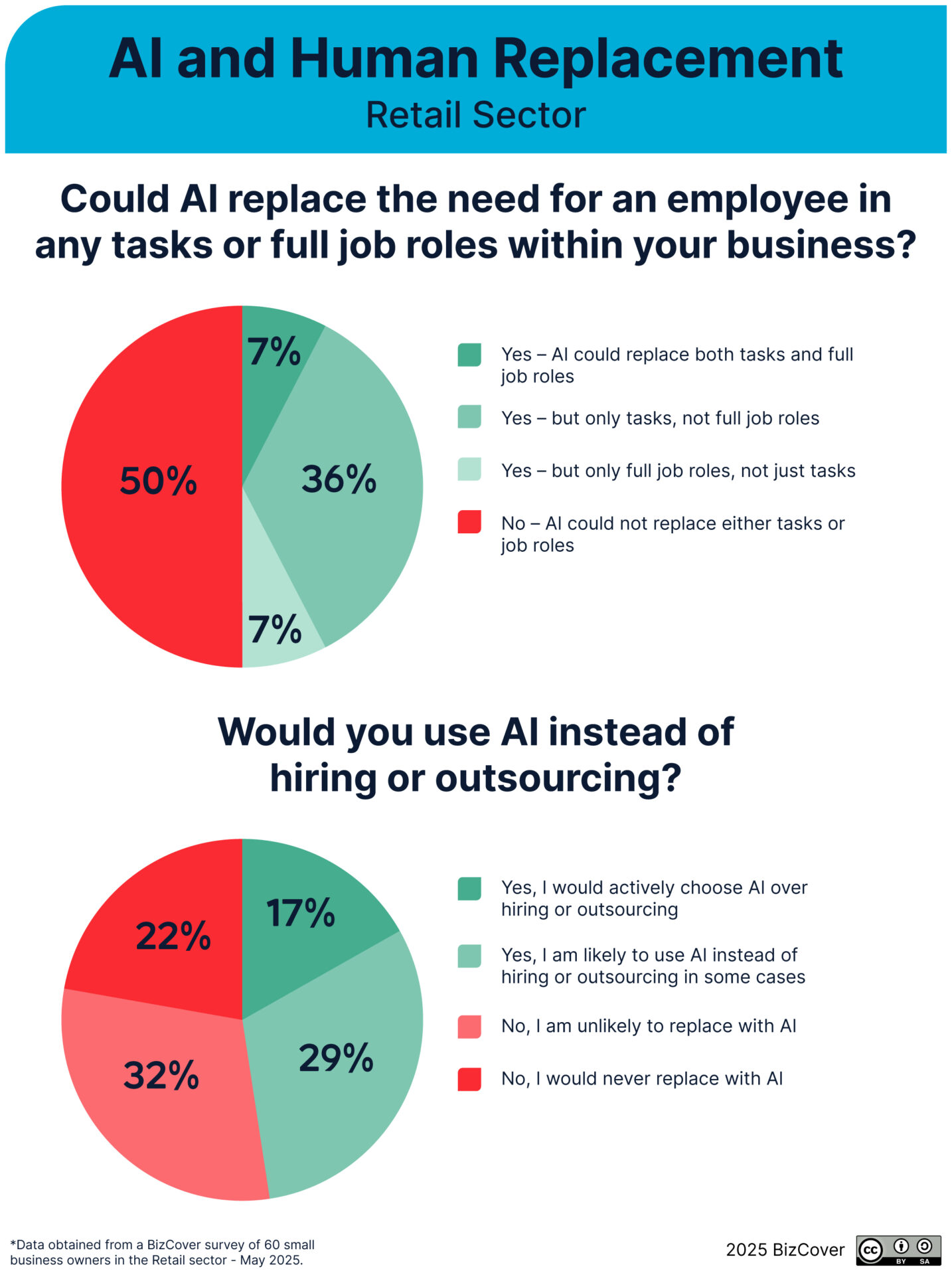
Skills of the future in retail
Looking ahead, many retailers are investing in creativity and innovation (47%), communication (32%), technical skills (29%), and digital literacy (25%). This suggests the sector is gearing up for change, but with a focus on well-rounded, people-centric strengths. However, it’s worth pointing out that only 10% are currently investing in AI-specific skills like data analytics or automation. This could indicate that broad digital readiness is taking priority over deep AI expertise for now.
When asked how AI might influence different skill areas, retailers had mixed views. Many believe AI could enhance project management (49%) and data analysis (42%), seeing these as areas where tech can provide meaningful support.
But not everyone is optimistic. 44% worry that interpersonal and social skills may decline with greater AI use, and 41% have similar concerns about decision-making and judgment.

Sentiment towards AI’s future impact in the retail sector
Surprisingly, retail professionals are largely optimistic about AI’s potential. Despite the fact that more than half (54%) are unlikely or unwilling to consider using AI tools instead of hiring a person, 61% feel positive about the impact AI could have on their skills and career. Many see it as a way to enhance the customer experience, streamline inventory management, and refine sales strategies. All of these factors are crucial when it comes to staying competitive in a rapidly evolving market.
Meanwhile, 32% remain neutral, suggesting they don’t expect AI to significantly alter their daily responsibilities. Only 7% express concern that automation could make their roles less relevant or lead to job displacement.
“Overall, the retail sector is optimistic about the future of AI,” concludes Kenny. “Many see it as a helpful tool for innovation and operational improvement. But most retailers are still banking on the importance of the human element, despite hiring challenges. It seems unlikely that AI will pose a serious risk to retail job security in the future.”
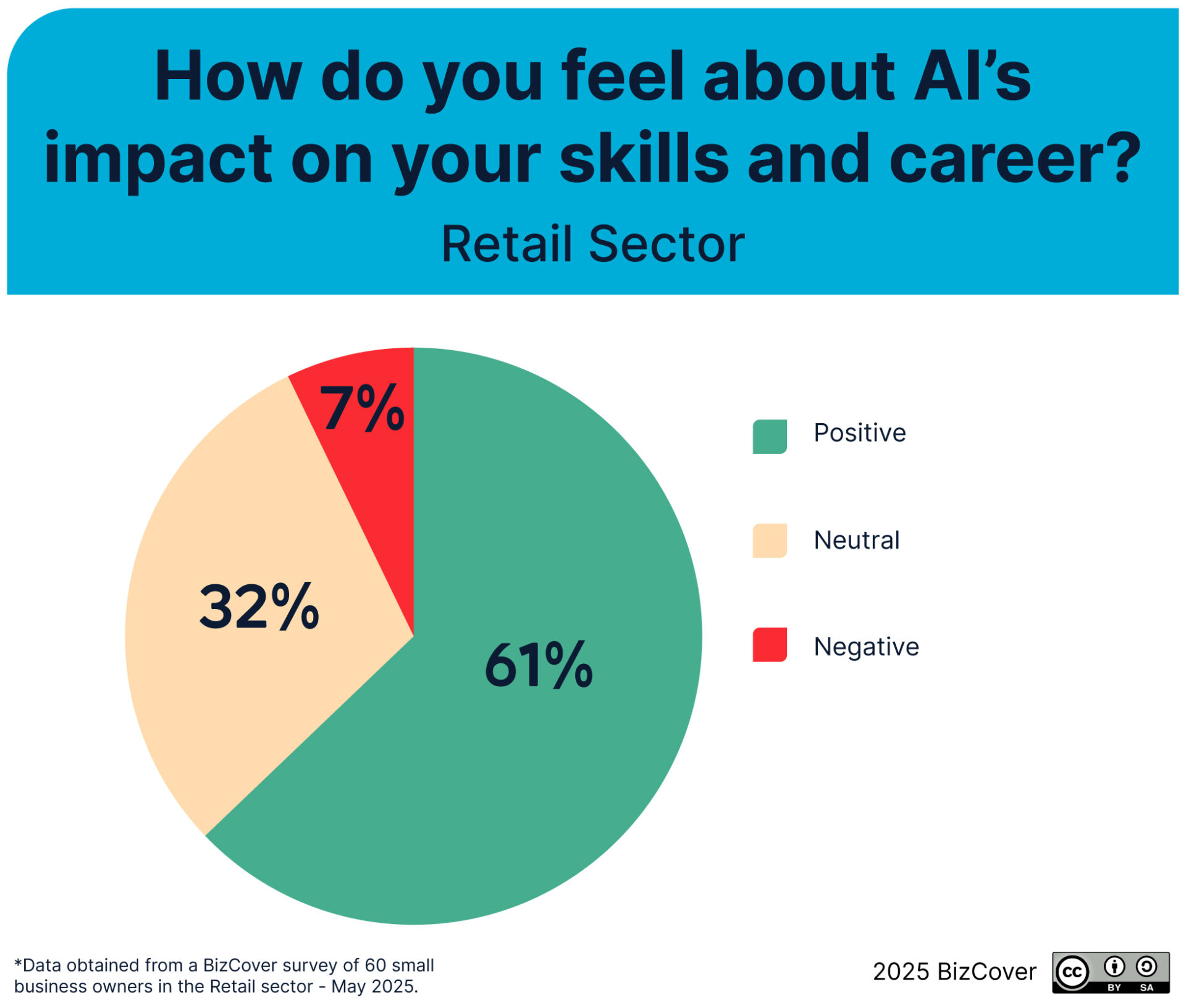
Conclusion: Embracing AI while preserving the Human touch
AI adoption among Australia’s small retail businesses is on the rise, with 70% already using AI tools and another 13% planning to adopt them soon. Retailers are turning to AI to improve marketing, customer communication, and back-end operations, while staying focused on delivering personal, people-centred service.
Although interest in AI is high, many retailers remain cautious about allowing it to fully replace staff. Instead, they’re investing in soft skills like creativity, communication and digital literacy to adapt alongside new technology.
At the end of the day, retail professionals are optimistic about AI’s role in driving efficiency and innovation. However, they’re very aware of the importance of interpersonal experiences and how it can set their business apart from the competition. They are confident about AI’s future capabilities, but still reluctant to dive into automation or to begin trying to combat the skills shortage with AI.
Methodology
This research was conducted via an online survey distributed to Australian business owners in April 2025. A total of 1,323 responses were collected. For the purposes of this analysis, only responses from small business owners (defined as those with 20 or fewer employees) were included, bringing the final sample size to 965.
These respondents represented seven industries, after excluding two industries with low response rates (fewer than 50 responses each) to ensure meaningful comparison. The remaining industries include Retail, Marketing and Communications, Consulting and Strategy, ICT, Healthcare and Medical, and others. There were 59 respondents from the Retail sector.
Respondents were asked a mix of multiple choice and checkbox questions covering AI adoption, its impact on operations and roles, and evolving skill requirements. The data has been analysed to highlight trends across small business owners, industries, and anticipated future use of AI in the small business sector.
This information is general only and does not take into account your objectives, financial situation or needs. It should not be relied upon as advice. As with any insurance, cover will be subject to the terms, conditions and exclusions contained in the policy wording or Product Disclosure Statement (available on our website). Please consider whether the advice is suitable for you before proceeding with any purchase. Target Market Determination document is also available (as applicable). © 2026 BizCover Pty Limited, all rights reserved. ABN 68 127 707 975; AFSL 501769.



